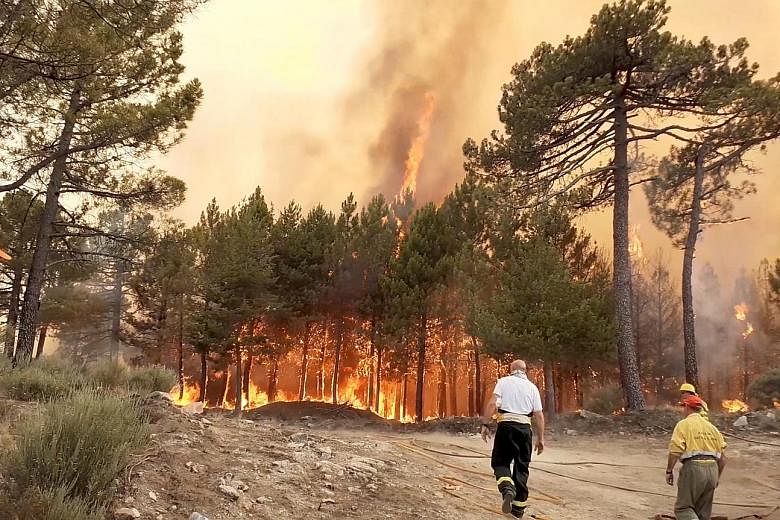NEW YORK • Across Europe last month, from the Czech Republic to Switzerland and Spain, new heat records tested the continent's defences. Schools were shuttered. Villages were evacuated. Soldiers battled wildfires.
It was not only monthly records that were shattered. Last Friday, a town in the south of France felt like Death Valley, California, in August. According to the French weather agency, Gallargues-le-Montueux hit 45.9 deg C, the highest temperature ever recorded in the country.
It is part of an unmistakable trend: The hottest summers in Europe in the past 500 years have all come in the past 17 years. Several of those heatwaves bear the fingerprints of human-caused climate change.
It is also unsurprising. As rising greenhouse gas emissions warm the planet - average global temperatures have gone up by around 1 deg C since the dawn of the industrial age - more and more heat records are broken all over the world.
The World Meteorological Organisation said on Monday: "It is premature to attribute the heatwave to climate change, but this is consistent with climate scenarios which predict more frequent, drawn-out and intense heat events as greenhouse gas concentrations lead to a rise in global temperatures."
Worldwide, 2019 is on track to be among the hottest years on record, and Europe is on the front line. Its wealth and social safety net have kept it from being ravaged. Hospitals work. Paramedics respond. Farmers have crop insurance.
The number of heatwaves in France has doubled in the past 34 years and is expected to double again by 2050, while the intensity is also expected to increase, according to the national weather service, Meteo-France.
In Germany, speed limits were imposed on parts of the autobahn because extreme heat can cause roads to buckle. In Spain, wildfires have destroyed nearly 10,000ha over the past several days in four different regions, forcing the evacuation of some villages. Last week, Italy's Health Ministry put more than a dozen cities on red alert as temperatures climbed above 37 deg C.
Extreme weather events have always happened. But a growing field of research called attribution science allows experts to assess how much global warming has stacked the deck in favour of any given weather event.
Researchers are increasingly citing changes in the polar jet stream, the fast-moving river of high-altitude air currents at the top of the globe, as an additional factor.
The meandering of the polar jet stream affects weather across the Northern Hemisphere. If these meanders, or ripples, are extreme, cold Arctic air can spill southwards or hotter air from the middle of the planet can move north.
Some scientists have linked extreme shifts in the jet stream to global warming, theorising that the melting of Arctic ice and the decreased temperature differential between the Arctic and lower latitudes have robbed the jet stream of some of its strength, causing it to meander more.
According to climate models, higher temperatures go hand in hand with what climate scientist Michael Mann at Pennsylvania State University calls a "meandering, slowed jet stream that favours stalled extreme weather regimes like the ones we are seeing right now". The jet stream is particularly "wiggly", he went on, when the Arctic is hot.
The Arctic has been warmer over the past five years than at any time since records began in 1900.

